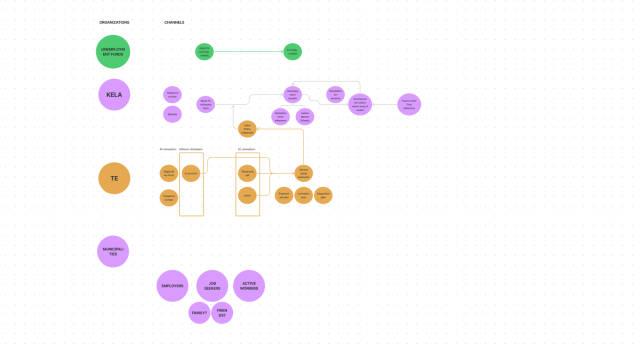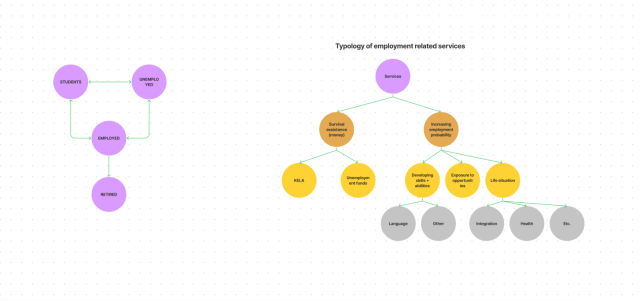This blog post reports on the work-in-progress within the DfG course! The post is written by group 2C dealing with the Ministry of Finance’s brief on Orchestrating public governance in employment services (TE2024) by focusing on the public servants’ needs in the new reform model. The group includes Sanne van der Linden from Creative Sustainability program, Mark Laukkanen from Information Networks program, Sera Remes from Collaborative and Industrial Design program, and Mathias Leopold Hörlesberger from New Media Design and Production program at Aalto University.
Written by: Mathias Leopold Hoerlesberger
Shifting responsibilities and new opportunities for muncipalities
The Finnish Employment and Economic Development Offices (TE-palvelut) are currently undergoing the biggest reform in half a century. The reform shifts the responsibilities of the TE-palvelut from the state- to municipal-level. Thus, the responsibilities of the TE-palvelut become a significant part of the reinvented service offerings of municipalities. Effectively, this reform means that employment services will be closer to jobseekers and TE offices can offer more individual support to jobseekers. At the moment, there exist both traditional TE offices of the state and pilot offices run by municipalities. As competencies shift during 2024, it’s in the interest of all stakeholders to provide smooth service deliveries to jobseekers across the country.
Our Design for Government project brief addresses the perspective of international jobseekers in Helsinki, Espoo and Vantaa. Many governmental and municipal initiatives aim at bringing internationals to Finland. Similarly, there is already a large international community living in Finland. For example, there are roughly 5 000 international graduates from Finnish universities every year and it is in the interest of the Finnish government to integrate them into the Finnish labor market. In this regard, it is exciting to work on a project brief that will have an edge on international graduates from Finnish universities.

Figure 1: Mapping of Service Touchpoints for International Jobseekers
Navigating a complex multi-stakeholder environment and accepting not to understand everything
Last week, we kicked off our project with a roundtable discussion. The event brought together different stakeholders from TE-palvelu, the Social Insurance Institution (KELA), Ministry of Economic Affairs and Employment (TEM), and pilot municipalities. For many participants, this was the first time meeting and hearing each other’s objectives. Similarly, it was important for us to hear the goals and expectations that ranged from high-level goals such as improving employment rate to overcoming language barriers and supporting unemployed people to getting what they need.
At the same time, we understood that the project takes place in a highly complex system, so we also have to acquaint ourselves with not being able to know everything. The challenge in the upcoming weeks will be to strike a balance between gathering insights to mitigate complexity, while accepting that some areas of the system will remain complex and unknown.

Figure 2: Mapping of Typology of employment related services
Human-centered research means learning from humans
The roundtable discussion showed, that in order to understand the complex environment and its challenges, we need to learn from the elements inhibiting the system. In this regard our research design focuses on three layers: international jobseeker experiences, front desk and customer support employees who know the challenges from within the existing system, and the existing digital and physical channels that jobseekers and employees navigate through.
We hope to achieve this by following a triangular research approach consisting of self-exploratory, qualitative, and quantitative research methods. Self-exploration and quantitative data from surveys on the pilot phases should provide us with enough preparation to remain flexible during the qualitative interviews. The interviews will be split between expert interviews from the TE services and KELA, and interviews with international jobseekers.
Through interviewing both sides of the service journey, backstage and frontstage, we should be able to get a better understanding of the challenges international jobseekers currently have.
The DfG course runs for 14 weeks each spring – the 2022 course has now started and runs from 28 Feb to 23 May. It’s an advanced studio course in which students work in multidisciplinary teams to address project briefs commissioned by governmental ministries in Finland. The course proceeds through the spring as a series of teaching modules in which various research and design methods are applied to address the project briefs. Blog posts are written by student groups, in which they share news, experiences and insights from within the course activities and their project development. More information here about the DfG 2022 project briefs. Hold the date for the public online finale online 09:00-12:00 AM (EEST) on Monday 23 May!

